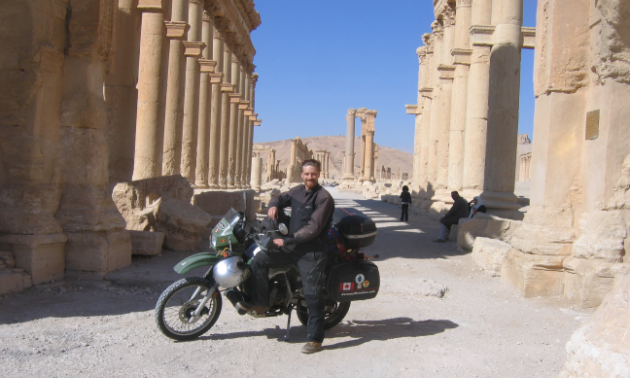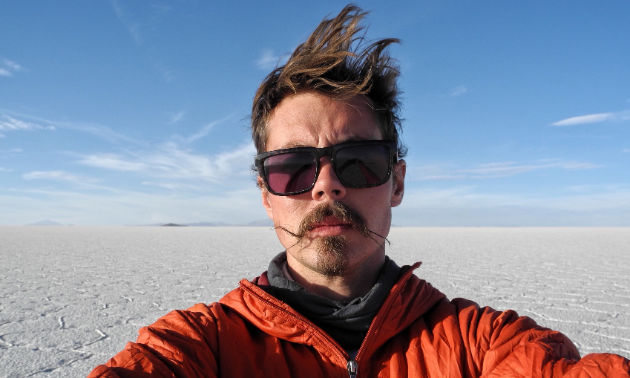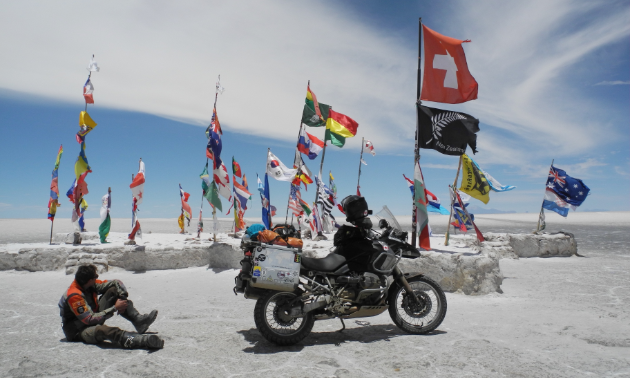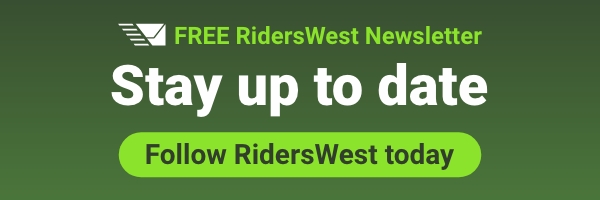Making your way across the world with not much more than two wheels, an engine and a passport can bring about some sketchy situations along with glorious adventures. Below are tales from two world travellers who have been there, done that and then some.
Jeremy Kroeker
Jeremy Kroeker is an author of two motorcycling books that chronicle his highlights and misadventures from trekking through the Middle East—Through Dust and Darkness—and his journey from Alberta to Panama—Canadian-bestseller Motorcycle Therapy.

Jeremy Kroeker has crossed much of the world. This photo was taken in Palmyra, Syria. — Photo courtesy Jeremy Kroeker
Have you encountered any sketchy situations with law enforcement officials?
Police officers in Egypt have been difficult. I was in the Libyan Desert in Egypt on the sand dunes with some friends. We were there without permits. We had a bit of trouble with a police officer who wanted to borrow our cell phone so that he could call the office and report us. We said ‘No, you can’t use our cell phone for that’ and just left. The next day we had to report to the police office and apologize to the officer so he could maintain some sort of dignity and then we were let go.
In Panama and Central America, you’ll often get pulled over for speed traps. Whether or not you’re speeding is irrelevant. You’ll be asked to contribute to the police officer’s pockets. Bribes have been suggested. So far, I haven’t paid any, except at one or two border crossings. It’s difficult to tell what is an official fee and what is a bribe. Basically, if you get a receipt for something, it’s above board. If you don’t get a receipt, then you just paid a bribe. Sometimes it’s a little bit murky.
Whenever I’m travelling, I tend to carry a mugger’s wallet. I’ve got expired credit cards in there with a few dollars, a fake driver’s license so it looks legitimate. When I’m pulled over by police, I’ll just say, ‘I don’t have any money, I need to get to a bank machine.’ If you say, ‘alright, let’s go to the police station. I’ll pay my fine there,’ you’ll often be dismissed.
The best policy is to go with patience and time and don’t pay bribes. Because if you start paying border officials or police officers at the side of the road, it might solve your problem in the here and now but it will make it more difficult for travellers who come behind you. If you start handing out cash, they see foreign travellers as easy money.
Kevin Chow
Kevin Chow has already completed the first portion of his journey around the world by making his way from Alaska to Argentina. He logs his exploits on his blog, World Overland. Next on his agenda is the land down under, Australia.

Kevin Chow snaps a selfie in Salar de Uyuni, Bolivia. — Photo courtesy Kevin Chow
Have you ever stumbled into any dangerous situations?
Copper Canyon is the Grand Canyon of Mexico but way more special because there are no tourists. Well, there’s a train that goes through Copper Canyon and tourists jump on the train so they can see the canyons. (Whereas) the off-road sections for 4x4s and motorcyclists, that is the Wild West.
Before going in there, I heard horror stories. ‘That’s where the narcos and drug lords live. You don’t want to go in there.’
I met a Swiss couple that wanted to go to Copper Canyon and owned a Land Rover. I said ‘Let’s just go together. I’ll slow down, you speed up a little bit. We’ll have lots of food and water because you guys have the truck. Let’s go see it.’ We were in there for seven days.
On day three, we stayed in a town called Tubares, which is a square with a church. There was an elementary school, a police building that was closed down and a gas station with gas in plastic drums. Because there’s nothing there, it’s a rad place. I set up my tent next to the cop shop. We had some kids come hang out with us. It was a great night.
Two days later, we got to a bigger town called Urique. The owner of the campsite talked to us and asked if we noticed gunshots in Tubares’s buildings. I said no but then started looking through my pictures of that town and there’s gunshots all over the church, police building—all over the place. I didn’t notice it when I was there but I noticed in the pictures. He said there was a huge gang war in that town and that’s why there aren’t people in that town. Everyone got killed. We’re like, ‘What!?’ He said, ‘Yeah, that’s Tubares. Everybody knows that. It’s safe now. That was a year ago.’
There are narcos in some places but they don’t mess with foreigners or tourists. I don’t think they have any reason to. It’s just internal fighting.
Have you had any close calls with the law?
You’re a foreigner on the road and don’t speak Spanish very well, so, yeah. But I just show them my route on the world map with a smile on my face and (the situation) deflates so fast. (Authorities) are like, ‘I don’t even care that you broke the law, I just want to look at your motorcycle now.’
Bolivia is an awesome country. It has brand-new tarmac all through the country with big shoulders and flat Canadian-style roads. In Bolivia, people can’t afford cars. There’s no traffic. You can do 150 (kilometres an hour) if you want.
On the way to Ushuaia where the salt flats are (in Argentina), I’m making wicked time since that was the first time I was able to do that since the States. I’m on wide-open desert roads. I crested over a hill and there’s a cop standing right in the middle of the road in the middle of nowhere with a radar gun. He points towards me and asks me to pull over.
I drop a bunch of gears and slam on the brakes to pull over. He shows me the gun and it says 138 (kilometres per hour). I’m pretty sure the speed limit was 80. He’s showing me the gun, wagging his finger. I pull off my helmet, I’m thinking, ‘What do I do? Sorry? Lo siento?’ I showed him the map, had a smile on my face, and I gave him a little bit of chocolate.
Meanwhile, another car comes down the road and we’re both eating chocolate out of my backpack. He pulls out his radar gun and the car is doing 85 so he flips the number around and shows me and says ‘trabaho,’ which means ‘working.’ So my 138 wasn’t on the radar gun anymore. I said, ‘Moto tortuga. Muy lento,’ which means ‘Turtle. It’s slow.’ He just laughed for a while. He didn’t ask for any paperwork. He just said ‘Okay, go,’ and I was out of there. No ticket. Nothing. It’s the smile. Just smile. The chocolate worked really well too.
There’s weird stuff that happens every day and that’s just part of it.








Comments